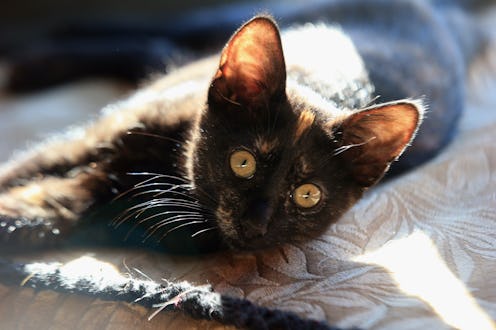
Cats, dogs, and humans: while these different creatures often cohabit in the same homes, you might have noticed that your bonding styles tend to differ. People typically associate dogs with tail-wagging and attention-seeking when their humans get home, while cats, well... cats can often take you or leave you, depending on their mood. But a new study suggests that cats actually bond with their owners in similar ways that humans and dogs bond with their companions.
The study, published in the journal Current Biology, found that domestic cats form the same kinds of attachments as human infants (and dogs) do. Though they're often thought of as rigid and cold, the study found that cats are socially flexible. By examining the styles of attachment displayed by cats' responses to spending time with and time apart from their human companions, the study concluded that cats can develop very secure attachment bonds with their humans.
To determine this, the study used the same assessment criteria used in studies on human children's attachment styles. The feline participants were kittens who spent two minutes in a room with their human, and then left alone in the room for two minutes. Then, when their human returned to the room for a two minute reunion, the researchers observed and classified the kittens' responses.
When the cats were securely bonded with their human caregiver, they demonstrated a reduced stress response upon the return of their human from the brief absence. The kittens, like securely-attached human children, returned to a relaxed exploration of their environment when their caregiver came back.
But the study also found that some kittens, like human children, experience insecure attachments with their caregivers. In very brief terms, humans can develop secure attachments with their parents, or they can develop various kinds of insecure attachments. According to British psychoanalyst John Bowlby, these insecure attachments include ambivalent attachments, or anxious attachments, which can occur when caregivers alternate between being nurturing and attentive and being intrusive and emotionally unavailable. Avoidant attachments, or insecure attachments, can result when caregivers are emotionally unavailable most of the time.
And cats, the study found, also experience these various kinds of attachments. Nearly 70% of the 70 kittens studied demonstrated secure attachments with their human caregivers. While both secure and avoidant attachments led the kittens to meow in similar distress when their caregivers left, the cats that felt more securely attached to their caregivers calmed significantly when their humans returned. Insecurely attached cats, like insecurely attached humans, either continued to be agitated when their caregiver returned or they seemed to completely ignore the reunion.
But if you're concerned that your cat might be one of the 30% with an insecure attachment bond with you, you should know that attachment patterns may form very early in life, but that doesn't mean that they can't change. Indeed, a 2017 study published in the Journal of Personality and Social Psychology found that cultivating healthy relationships as an adult can improve the well-being and sense of security of people with avoidant attachments who might find it painfully difficult to seek help from other people.
And a 2019 study, also published in the Journal of Personality and Social Psychology, found that attachment anxiety and insecurity tended to decrease over the decades of a person's life. Being in healthy relationships helped ease the attachment anxiety of participants, the study observed. But the study also concluded that men, lacking the social encouragement to talk through their emotions and traumatic experiences, tended to maintain higher levels of avoiding attachment over time.
So while cat's lives, even with all nine of them, might not span across decades, research into human attachment patterns suggest that if your cat seems to have an insecure attachment to you, all is not lost. A lot of love and attentiveness, given with your furball's consent, can go a long way to making them feel comforted by your coming home every day. Even if they don't go out of their way to show you their affection.